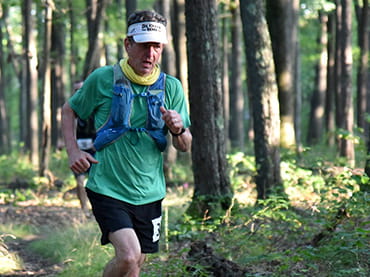During a July 2019 physical, Dan Kendra had a shocking revelation. Despite being an ultramarathoner — training year-round and running up to 100 miles in competitions — the 56-year-old was overweight and on the path to diabetes with high cholesterol and high blood pressure.
“That was a big red flag,” says Dan. “I knew I was doing something wrong because I was eating better than most of America.”
Without some changes, his doctor warned he’d likely need to increase his current cholesterol medicine and add blood pressure medicine to his regimen. Dan immediately cut back on sodium. He began educating himself about macronutrients like carbohydrates, fat, and protein, and started tracking his food intake.
Dan also started searching for someone who could provide more guidance — someone who understood an athlete’s special dietary requirements. That search led him to the team of sports nutrition experts at UPMC Sports Medicine.
Although the team works with people of all ages, most are high school and college athletes. “It’s unusual to work with someone who is a high level, motivated senior athlete,” the team says. “Dan is unique. He’s on another level.”
Taking Nutrition to a New Level
By the time they met in January 2020 at the UPMC Lemieux Sports Complex, Dan was already making great strides. He’d lost almost 20 pounds, but at 5 feet 8 inches was still considered overweight at 170 pounds. His BMI was down to 25.8.
"I'm 58 years old. I'm not supposed to be doing these things. These results show me that my food intake is working." — Dan
He had switched to a whole food, plant-based diet and closely followed USDA food guidelines. But as an ultrarunner, Dan felt he was falling short in the nutritional intake he needed.
“The weight was coming off, I was feeling better, and exercising better. But I needed professional guidance,” says Dan, a North Sewickley Township resident.
Ultramarathons are any race longer than a standard 26.2-mile marathon. They range from 50K to 50 miles, 100K, and 100 miles. Training is critical to build endurance and leg strength. But runners also need the right amount of nutrients and electrolytes to keep their body fueled throughout the run.
Because Dan was already tracking his food intake, he was able to provide detailed information at his first appointment. The sports nutritionists used that information along with Dan’s metrics (his weight, height, age, body fat, training schedule, and training volume) to calculate his energy needs. They explained to Dan that he needed to fuel his body with food and water according to his activity level. The team made recommendations for light days, moderate days (one to two hours of training), and heavy days (two-plus hours of training), with daily calorie intake ranging from 2,000 to 3,000. During training and competitions when Dan runs as much as 30 hours straight, they recommended 30 to 60 grams of carbs every hour after the first hour, plus two to three cups of water per hour.
Those numbers were “eye popping” to Dan, who had worked so hard to lose weight. But he was “all in.”
“This is science. This is research. This is what every endurance athlete needs,” says one of our sports nutritionists. “Dan just needed some guidance, then I stepped back and let him do his thing. And he crushed it!”
Big Results
Since his meeting with the team, Dan shed another 15 pounds. He now weighs in at 154 pounds with a BMI of 23.7. He is off all medicine and his blood pressure is now a healthy 112/70.
Even more remarkable were his 2021 results in these local and regional races:
- In May, he completed the Glacier Ridge 50K in just under 6 hours, 14 minutes, placing 11th and shaving 35 minutes off his 2011 personal record for that distance.
- In July, he placed first in the Hell Hath No Hurry 50-miler with a time of 9 hours, 34 minutes — nearly one hour ahead of the second-place runner.
- In October, he completed the 100-mile Oil Creek Ultra in 30 hours, 21 minutes in miserable conditions — placing 17th of the 26 who finished (84 started).
“I’m 58 years old. I’m not supposed to be doing these things,” says Dan. “These results show me that my food intake is working.”
Long-distance runners normally must cope with delayed onset muscle soreness following competition. But Dan says that soreness is gone now, even when running in the worst conditions in October.
“After 30 hours of running in the mud, I felt fine,” says Dan. “That’s another benefit — the inflammation and soreness isn’t there anymore.”
Dan credits sports nutrition at UPMC Sports Medicine with providing the nutritional foundation he needed to “take my sport to the next level.” He’s now telling fellow ultrarunners and triathletes about the importance of a good nutrition plan.
“Nutrition done right can have a big impact on performance,” says Dan. “I’m a prime example of that.”

















